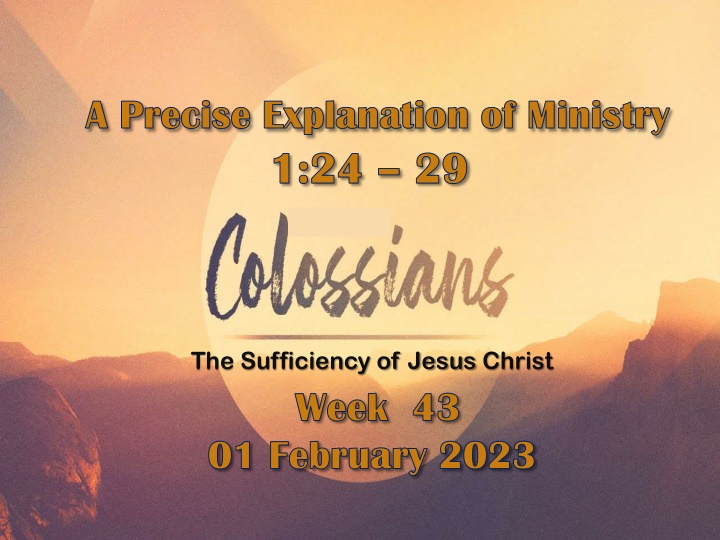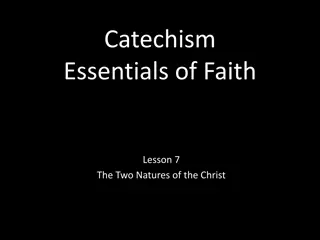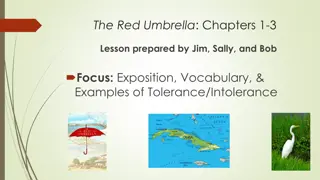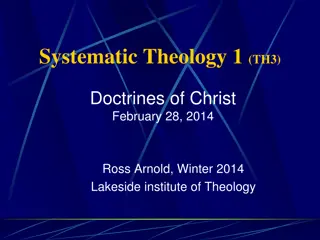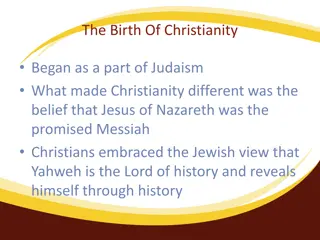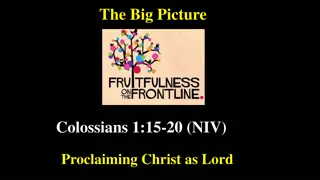Exposition on the Sufficiency of Jesus Christ in Colossians
In the book of Colossians, Paul emphasizes the preeminence and sufficiency of Jesus Christ. Through deep gratitude, prayer, and doctrinal teachings, Paul highlights Christ's divine nature, lordship over all, and role in creation and reconciliation. This exhortation encourages believers to remain steadfast in their faith and reflect Christ in their ministry.
Download Presentation

Please find below an Image/Link to download the presentation.
The content on the website is provided AS IS for your information and personal use only. It may not be sold, licensed, or shared on other websites without obtaining consent from the author.If you encounter any issues during the download, it is possible that the publisher has removed the file from their server.
You are allowed to download the files provided on this website for personal or commercial use, subject to the condition that they are used lawfully. All files are the property of their respective owners.
The content on the website is provided AS IS for your information and personal use only. It may not be sold, licensed, or shared on other websites without obtaining consent from the author.
E N D
Presentation Transcript
A Precise Explanation of Ministry A Precise Explanation of Ministry 1:24 1:24 29 29 The Sufficiency of Jesus Christ Week 43 Week 43 01 February 2023 01 February 2023
Pauls Pattern of Presentation Christ Is Christ Is Preeminent in All Things Preeminent in All Things Supreme Lord Supreme Lord - - Sufficient Savior Sufficient Savior Colossians 1 Colossians 1 Colossians 2 Colossians 2 Colossians 3 Colossians 3 Colossians 4 Colossians 4 Supremacy of Supremacy of Christ Christ Submission to Submission to Christ Christ Doctrinal Doctrinal and Corrective and Corrective Practical Practical and Reassuring and Reassuring What Christ What Christ Did For Us Did For Us What Christ What Christ Does Through Us Does Through Us Christ Christ Our Lord Our Lord Christ Christ Our Life Our Life Christ Christ our Love our Love Christ the Christ the Head of the Body Head of the Body Christ the Lord Christ the Lord of the Universe of the Universe Christ the Christ the Head of the Home Head of the Home Instruction Instruction Warnings Warnings Exhortations Exhortations Reminders Reminders Reconciliation Reconciliation Creation Creation Submission Submission Conversation Conversation His Person His Person and Work and Work His Peace His Peace and Presence and Presence
COLOSSIANS CHAPTER OVERVIEW In Chapter 1:3-8, Paul begins by expressing his deep gratitude for the Colossian believers, and showing his authentic care and concern for them in his prayer. In verses 9-14, with a thankful heart, pointing to the will of Jesus Christ our Lord, Paul prays for the indispensable spiritual virtues of knowledge, wisdom, and understanding. In verses 15-20, in what may have been and early hymn, Paul will express one of the most profound and powerful articulations of the deity and humanity of Christ (Christology) and His absolute lordship over all things.
COLOSSIANS CHAPTER OVERVIEW In these verses (15-20), Paul reminds us that Christ alone is preeminent over everything. Paul also reminds us that Christ is fully human and fully divine, and that He is the Source of and Ruler over all creation, and the One who reconciles both heaven and earth. Lastly, in verses 21-29, Paul uses this magnificent Christ hymn to encourage and challenge the Colossians to continue in their faith in Jesus as Lord, explaining that authentic ministry derives from their faith and from the hope they received from the proclamation of the gospel.
COLOSSIANS LESSON OVERVIEW A Precise Explanation of Ministry! If used occasionally, a knife remains sharp and continues to cut with precision. However, when we use a knife regularly, it begins to lose its edge. Words are like that. Certain words are used so frequently that they begin to lose their edge. Their real meanings become blunted by cliches, dulled by familiarity, and rendered ineffective by diminished precision. This is especially true of the word ministry, a word that is tossed around in church and other Christian contexts. Because of it over use, the term now conveys a wide variety of meanings, many of which have little if anything to do with actual ministry.
COLOSSIANS LESSON OVERVIEW The same could be said of those who serve as ministers. What exactly does it mean to be a minister? And what is involved in having a ministry in the lives of others? It s interesting to note that when we think about ministry we re often better at pointing out what it s not supposed to be than explaining what it should be. For example, we know it s not supposed to be a commercial enterprise selling goods and services, nor an entertainment industry selling tickets hoping for great reviews and boosted rating; nor an educational institution charging tuition and offering degrees. A ministry is not supposed to be a country club, a manufacturing plant, or a war room. We know that much.
COLOSSIANS LESSON OVERVIEW But how do we define an authentic, healthy ministry? Paul understood his role as a minister meant he was God s servant. He was first and foremost under the authority of the Lord to whom he had to give an account. Though he was to serve on behalf of the flock, it was not to the flock that he was to be subject, but to the Lord Jesus Christ (1 Pet. 5:1-4). And as a minister of God, he was sworn to a single task: to proclaim the gospel of Jesus Christ (1:23). Paul had a clear understanding of the calling, character, responsibility, and the task of the minister. But what about ministry itself?
COLOSSIANS LESSON OVERVIEW These final verses will reveal that Paul has in mind three essentialaspects of authentic ministry, which are pertinent for every generation: Suffering for Christ (1:24). Proclaiming Christ (1:25-28). Depending on Christ (1:29).
COLOSSIANS 1:24 24I now rejoice in my sufferings for you, and fill up in my flesh what is lacking in the afflictions of Christ, for the sake of His body which is the Church.
COLOSSIANS 1:24 What s the first thing that comes to mind when you hear the word suffering? If you re like most of us you probably think about pain, misery, sadness or maybe even Christ suffering on the cross. Chances are the first word that popped into your mind wasn t rejoicing. But that is exactly how Paul describes suffering as he begins to talk about his own ministry: I rejoice in my sufferings (1:24). How could Paul rejoice? As an authentic minister of the gospel of Christ, Paul knew that his suffering was for the sake of others: My sufferings [are] for you (1:24). This is the first essential aspect of authentic ministry.
COLOSSIANS 1:24 I. Suffering for Christ and His people (the church). As an authentic minister of the gospel and a servant of Christ what kind of suffering had Paul endured? More often in labors . . . imprisonments, [being] beaten multiple times, often in danger of death. Five times received thirty-nine lashes from the Jews. Three times beaten with a rod, stoned once, shipwrecked three times, a night and day in the deep. On multiple journeys, Paul was in dangers from river, from robbers, from countrymen, from gentiles, faced dangers in the city, dangers in the wilderness, dangers on the sea, dangers among false brethren (2Cor. 11:23-26).
COLOSSIANS 1:24 Paul had been in labor and hardship, through many sleepless nights, in hunger and thirst, often without food, in the cold and exposure. Apart from such external things, there is the daily pressure of concern for all the churches (2Cor. 11:27-28). In all of these sufferings for the sake of the ministry of the gospel, there isn t a hint of self-pity. Instead, Paul expresses real deep seated joy in doing his part for the sake of His body the church (1:24). He knew that what he suffered had purpose. In so doing, Paul experienced the grace and power of God by suffering just as Christ had suffered (Phil. 3:10-11). Romans 8:17-18, confirms that there is a special honor given to those who suffer for Christ.
COLOSSIANS 1:24 However, in Colossians Paul is much more concerned about fulfilling his ministry of suffering on behalf of others for the strengthening of the Church. Paul says, this suffering is to fill up in my flesh what is lacking in the afflictions of Christ (1:24). At first glance, this may sound like something is lacking in Christ s once-for-all suffering and death on the cross; that maybe Paul s suffering was necessary to continue to pay for residual sins that Christ s suffering somehow didn t cover. If that is not the case, then what does Paul mean by this expression?
COLOSSIANS 1:24 So let s consider a different translation of that verse: I am glad when I suffer for you in my body, for I am participating in the sufferings of Christ that continue for his body, the church (1:24 NLT). Swindoll quoting Douglass Moo suggest that, Because Paul s apostolic ministry is an extension of Christ s work in the world, Paul identifies his own sufferings very closely with Christ s. However his sufferings have no redemptive benefit for the church, they are the inevitable accomplishments of Paul s commission to proclaim the end-time revelation of God s mystery.
COLOSSIANS 1:24 So we can confidently interpret Paul s statement to say: That which is lacking of the afflictions of Christ signifies that portions of Christ s ministerial sufferings which was not endured by Him in person, but is endured in the suffering of Christians in all generations in carrying out Christ s work. Paul having in mind Christ s close association with His body, the church, conveys that now when one persecutes the body, that same persecution in a sense is extended to Christ. In a sense, Paul is filling up the fixed amount of suffering that the church must endure until the second coming of Christ and the end of all persecution and suffering.
COLOSSIANS 1:24 Authentic ministry is characterized by those who are willing to suffer for the sack of Christ, for the church, and for the gospel proclamation. In our world of indulged comfort, where we recoil at any though of hardship or mistreatment, this concept of fulfilling our calling to suffer for Christ seem foreign. In many place around the world, though, this is a common expectation for minister of Christ, who suffer regularly at the hands of unbelievers. Even in places where Christ can be freely proclaimed and embraced, authentic ministry requires ministers to enter into the sufferings of their flock, instead of fleeing from it.
COLOSSIANS 1:24 Swindoll again quoting Eugene Peter says this about authentic ministry: Among other things pastoral work is a decision to deal, on the most personal and intimate terms, with suffering. It does not try to find ways to minimize suffering or ways to avoid it. It is not particularly interested in finding explanations for it. It is not a search after the cure for suffering. Pastoral work engages suffering. It is a conscious, deliberated plunge into the experience of suffering. One of the task of a minister is to help people live through their pain and suffering, in fact to survive and thrive in the midst of it.
COLOSSIANS 1:24 Ministers who are too busy to do that are too busy for authentic ministry. People who are entering into the lives of others: Invest time. They listen. They care. They weep and grieve. A ministry is not healthy if those who minister refuse to enter into suffering on behalf of others.
COLOSSIANS 1:25 - 28 25of which I became a minister according to the stewardship from God which was given to me for you, to fulfill the word of God,26themystery which has been hidden from ages and from generations, but now has been revealed to His saints. 27To them God willed to make known what are the riches of the glory of this mystery among the Gentiles: which is Christ in you, the hope of glory. 28Him we preach, warning every man and teaching every man in all wisdom, that we may present every man perfect in Christ Jesus.
COLOSSIANS 1:25 - 28 II. Proclaiming Christ. Is the second essential aspect of authentic ministry. Paul states, in 1:25, that it s his God-given stewardship to fully carry out the preaching of the word of God. The content of this message from God was once stored in His unrevealed plans, but with the coming of Christ it has been unveiled and made manifest to the Church (1:26). What s the great secret that has been entrusted to Paul and his fellow ministers? It s that Christ now dwells among and within the believer Christ in you the hope of glory (1:27).
COLOSSIANS 1:25 - 28 God s saving mercy, once openly proclaimed only among the Jews through their prophets and in their Holy Scripture, was now being proclaimed far and wide among Jews and Gentiles alike through the person and work of Jesus Christ! The Gentiles could now experience all the benefits of being children of God: They were now included in the glory and the riches of God s grace. They had received redemption, reconciliation, and forgiveness of sins. Christ lived in them by the Spirit, filling them with inner hope.
COLOSSIANS 1:25 - 28 This was absolutely revolutionary. Not only would the Gentiles have difficulty believing this message, but the Jews would resent it and reject it. Think about want this message of salvation by gracealone, through faithalone, in Christalone, must have meant to the Gentiles who never dreamed that such salvation would come to them! In 1:28, Paul reveals the main content of his proclamation: Him we preach. Christ alone was the focus of Paul s preaching. In 1Cor. 2:2, Paul writes: I determined to know nothing among you except Jesus Christ, and Him crucified.
COLOSSIANS 1:25 - 28 A ministry that drifts from the proclamation of the saving work of Christ is a ministry that has strayed from authenticity. No gospel message is complete and no ministry is healthy if it doesn t point people to the name above every name, Jesus Christ. The passionate proclamation of the person and work of Jesus Christ and what He expects from those who have been saved by His grace involves both admonishing and teaching (1:28). FIRST Admonishing represents what might be called the negative ministry of the Word.
COLOSSIANS 1:25 - 28 The Greek word noutheteo,(new-the-ta-o)translated admonish, means to counsel about avoidance or cessation of an improper course of conduct. Any ministry that neglects or deliberately leaves out admonition is an unreliable and inauthentic ministry. This is why Paul solemnly charged Timothy to preach the word; be ready in season and out of season; reprove, rebuke, exhort, with great patience and instruction (2 Tim. 4:2). SECOND Teaching represents what can be called the positive aspect of the ministry of the Word. While admonishing warns people about what not to believe or do, teaching instructs them in how to think and live as followers of Jesus Christ.
COLOSSIANS 1:25 - 28 In a healthy ministry, both of these sides of authentic proclamation go hand in hand. Just as some ministries can get off-kilter by neglecting admonition, other ministries can go awry by overemphasizing the negative. Authentic proclamation needs both teaching and admonition. How useful would road signs be if they only told us where the road did not go. On our daily commute how many accidents would we encounter, if there were no stop lights, yellow warning signs, speed limits, or no prospect of being pulled over? People need some constraints to keep them from danger.
COLOSSIANS 1:25 - 28 So how do ministries know how much teaching and how much admonition to apply for each person s particular circumstance? It takes God-given wisdom and a clear understanding of where it is we re trying to lead people. This is the way Paul writes that ministries are to admonish and instruct every person with all wisdom, so that we may present every man complete in Christ (1:28). Complete referring to maturity is the result of ongoing spiritual growth through the effective application of God s Word. A ministry is healthy when those who minister proclaim Christ by wisely admonishingandinstructing other toward maturity in Him.
COLOSSIANS 1:29 29To this end I also labor, striving according to His working which works in me mightily.
COLOSSIANS 1:29 III. Depending on Christ. Anybody who has spent any length of time in ministry knows it s agonizing work. Paul uses strong language to communicate this fact to those who may have no idea about the struggles involved in authentic ministry. Two verbs are used in 1:29, to describe the work of ministry: Kopiao (cope-ee-ah-o) meaning to labor Agonizomai (ag-o-nid-zom-my) meaning to strive The first term refer to exerting oneself physically, mentally, or spiritually. The second refers to fighting or struggling to accomplish a difficult task.
COLOSSIANS 1:29 Paul doesn t leave the description at laborandstrive. Had he done so, we d have the impression that God assigns a nearly impossible task and then says, It s all your responsibility now. Have at it! See you when it s done! Not at all! Rather Paul says, I labor, striving according to His power, which mightily works within me (1:29 NASB). The key to laboring effectively in the agonizing struggle of ministry is dependence on the power of Christ. Christ empowers His ministers to suffer, to proclaim the good news, and to endure hardship and labor until the end. A ministry is healthy when those minister depend on Christ for the power to labor and to strive for the sake of the call.
APPLICATIONS OF THE LESSON A Precise Explanation of Ministry
COLOSSIANS APPLICATION We don t need a Damascus-road conversion or a personal Shore-of-Galilee summons to be called into ministry. Everyone of us who personally accepted Christ as Savior and seeks to serve Him as Lord has a calling to minister to others and we have been gifted by the Spirit. It s not just the evangelists, pastors, and teachers who are called to ministry. In fact, their God-given task is the equipping of the saints for the work of ministry (Eph. 4:12). That includes all who are in the body of Christ, which means if you claim the name of Christ, you share a common calling with all other believers: To minister in the body!
COLOSSIANS APPLICATION Since we are all called to minister in the body. Paul s message here in Colossians 1:24-29 offers four important reminders about healthy authentic ministry that directly relates to all of us: FIRST we re appointed as servants, not hired just to hold a job. Some of us who have been trained, ordained, and called into full-time service get compensated for our labor (1Tim. 5:17-18). But even then, those paid workers are to be servants of Christ and ministers in His body. They are to take their cues from Him and follow His example of shepherding (1Pet. 5:1-4).
COLOSSIANS APPLICATION SECOND we should be joyful in suffering, not resentful of it. It svital that a minister doesn t try to circumvent the difficult road of hardship and the painful path of struggle. As we endure our own trials and tribulations, we learn how to empathize with others who are going through the same kind of struggles (2Cor. 1:3-7).
COLOSSIANS APPLICATION THIRD we should loudly proclaim the mystery of Christ, not keep it to ourselves. Everyone needs to hear the good news of reconciliation, redemption and eternal salvation through Jesus Christ. It shouldn t be a burden, but a privilege to share that message. Since the gospel has come to Jews, Gentiles, slave, free, men and women, there is no place in ministry to discriminate along racial, ethnic, socioeconomic or religious lines. It is our joy to share the good news with all (James 2:1-9).
COLOSSIANS APPLICATION FOURTH we should give ministry our all, not slack off or hold back. When we reach the end of our lives whenever that will be we ll never regret the time we spent serving others for the sake of Christ. We ll never wish we had spent more time at work, or playing sports, or shopping rather than teaching our children the fear to the Lord. We won t shed tears over missed naps when we spend Sunday afternoons meeting the needs of brothers and sisters in Christ. We won t regret spending our money in ministry, or on evangelism, or missions rather than indulging our passions for entertainment and pleasure (1Cor. 3:5-15).
NEXT CLASS 08 Feb 2023 Before next class, read the below chapters in Before next class, read the below chapters in the KJV and in one other versions of the Bible, the KJV and in one other versions of the Bible, i.e., NKJV, NRSV, NIV, CEV, etc i.e., NKJV, NRSV, NIV, CEV, etc Chapter 2:01 2:10 Counsel from a Concerned Apostle
